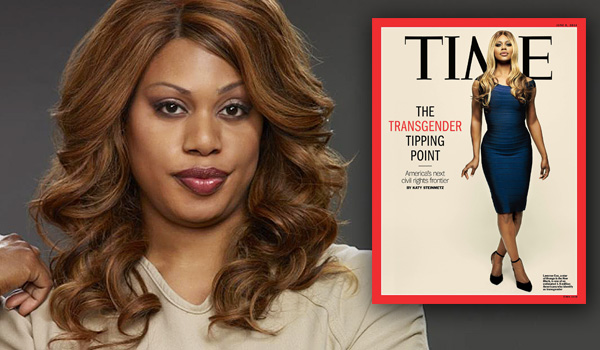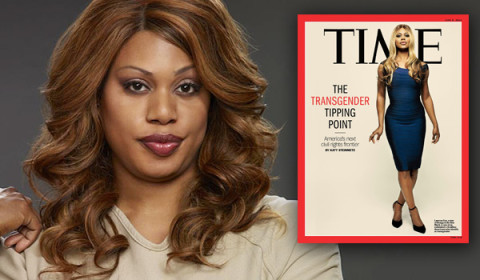The National Review‘s Kevin Williamson went out of his way to be provocative in his article about transgendered actress Laverne Cox:
 The world is abuzz with news that actor Laverne Cox has become the first transgender person to appear on the cover of Time magazine. If I understand the current state of the ever-shifting ethic and rhetoric of transgenderism, that is not quite true: Bradley Manning, whom we are expected now to call Chelsea, beat Cox to the punch by some time. Manning’s announcement of his intention to begin living his life as a woman and to undergo so-called sex-reassignment surgery came after Time’s story, but, given that we are expected to defer to all subjective experience in the matter of gender identity, it could not possibly be the case that Manning is a transgendered person today but was not at the time of the Time cover simply because Time was unaware of the fact, unless the issuance of a press release is now a critical step in the evolutionary process.
The world is abuzz with news that actor Laverne Cox has become the first transgender person to appear on the cover of Time magazine. If I understand the current state of the ever-shifting ethic and rhetoric of transgenderism, that is not quite true: Bradley Manning, whom we are expected now to call Chelsea, beat Cox to the punch by some time. Manning’s announcement of his intention to begin living his life as a woman and to undergo so-called sex-reassignment surgery came after Time’s story, but, given that we are expected to defer to all subjective experience in the matter of gender identity, it could not possibly be the case that Manning is a transgendered person today but was not at the time of the Time cover simply because Time was unaware of the fact, unless the issuance of a press release is now a critical step in the evolutionary process.
As I wrote at the time of the Manning announcement, Bradley Manning is not a woman. Neither is Laverne Cox.
Cox, a fine actor, has become a spokesman — no doubt he would object to the term — for trans people, whose characteristics may include a wide variety of self-conceptions and physical traits. Katie Couric famously asked him about whether he had undergone surgical alteration, and he rejected the question as invasive, though what counts as invasive when you are being interviewed by Katie Couric about features of your sexual identity is open to interpretation. Couric was roundly denounced for the question and for using “transgenders” as a noun, and God help her if she had misdeployed a pronoun, which is now considered practically a hate crime.
On cue, Tom Chivers responds:
For Williamson, the term “trans woman” is, of course, meaningless. He refers to Cox as “he” throughout his piece (despite a Clarksonesque but-you-can’t-say-that-these-days line about how “misdeploying” pronouns “is now considered practically a hate crime”) and says that our modern sensibilities of referring to trans people as their preferred gender is “sympathetic magic”, “treating delusion as fact”, “policing language on the theory that language mystically shapes reality”, like a “voodoo doll”. “Regardless of the question of whether he has had his genitals amputated, Cox is not a woman, but an effigy of a woman,” he says.
This, Williamson would no doubt claim, is the-emperor-has-no-clothes telling-it-like-it-is. “Sex is a biological reality,” he points out, unarguably. Indeed it is. No amount of surgery or hormone therapy will allow Cox to become pregnant, no terms of address will turn that stubborn Y chromosome into a second X. That is, indeed, a simple fact of human biology.
But who disagrees with that? No one. Williamson’s fearless truthsaying is, in fact, a fatuous statement of the obvious, dressed up as iconoclasm. Nobody in the world believes that calling Cox and other trans women “women”, using the pronouns “she” and “her”, will change anything biological; they know that she will not be able to have children, no matter what words we use. They do it out of respect, and sensitivity – what we used, in fact, to call politeness. If someone wishes to be addressed as X, then it is polite, usually, to do so. There may be times when other considerations apply: if someone insists on being referred to as “Doctor” and using that to give them unearned authority, say. But if someone wants to change their name, then we are happy to let them do so, and to address them by their chosen name, because it’s their business. I see no reason why changing one’s chosen pronouns should be any different.
Update. On the non-confrontational side, Elio Iannacci reports on Laverne Cox for Maclean’s:
The standout figure in all this flurry of activity, of course, is advocate/actress Laverne Cox, who graces the cover of this week’s issue of Time magazine. Cox is the breakout star of Netflix’s popular prison drama, Orange Is The New Black, which begins airing its second season next week.
Cox, an academic, writer and film producer as well as performer, has been fighting for Trans rights well before she had her first major guest spot on Law & Order and appeared in the reality show I Want To Work For Diddy in 2008. She says trans issues weren’t broached so intelligently five years ago. “I’m not naming names because I’m a working actress … but let’s get real,” she says via phone from New York City. “We’ve had such a wave of trans-ploitation films and TV — but that’s changing.” She is aggressively seeking to be a part of that change; she’s producing a documentary on transgender teens as well as one on Ce Ce MacDonald, an African-American trans woman who served a 41-month prison sentence in a men’s prison in Minnesota. “We are in the midst of a revolutionary moment,” she says.
Even a few years ago, the current profusion of trans characters and would have been unimaginable. A trans character was more likely an afterthought in a script, treated as a cliché or a freak. Most had more in common with Jared Leto’s trans character in Dallas Buyers Club, an Oscar-winning role that some critics have protested, saying it mirrors the offensive Mammy caricature in Gone With The Wind. On the fourth season of the popular reality series Project Runway, in 2008, fashion designer Christian Seriano used disparaging phrases such as “hot tranny mess” to describe inelegant or unstylish people. The word seeped into mainstream vernacular.
“We’ve had years of being at the end of the bad jokes and getting our bodies sensationalized,” says Cox, “but we have since learned to speak up. Transgender people in social media began standing up and saying, ‘This is not me and this is not acceptable.’ ”

 Yet, at the same time, the trans-rights movement is growing in power and cachet: a recent Time cover featuring the actress Laverne Cox was headlined “THE TRANSGENDER TIPPING POINT.” The very word “transgender,” which first came into wide use in the nineteen-nineties, encompasses far more people than the term “transsexual” did. It includes not just the small number of people who seek gender-reassignment surgery—according to frequently cited estimates, about one in thirty thousand men and one in a hundred thousand women—but also those who take hormones, or who simply identify with the opposite gender, or, in some cases, with both or with neither. (According to the National Center survey, most trans women have taken female hormones, but only about a quarter of them have had genital surgery.) The elasticity of the term “transgender” has forced a rethinking of what sex and gender mean; at least in progressive circles, what’s determinative isn’t people’s chromosomes or their genitals or the way that they were brought up but how they see themselves.
Yet, at the same time, the trans-rights movement is growing in power and cachet: a recent Time cover featuring the actress Laverne Cox was headlined “THE TRANSGENDER TIPPING POINT.” The very word “transgender,” which first came into wide use in the nineteen-nineties, encompasses far more people than the term “transsexual” did. It includes not just the small number of people who seek gender-reassignment surgery—according to frequently cited estimates, about one in thirty thousand men and one in a hundred thousand women—but also those who take hormones, or who simply identify with the opposite gender, or, in some cases, with both or with neither. (According to the National Center survey, most trans women have taken female hormones, but only about a quarter of them have had genital surgery.) The elasticity of the term “transgender” has forced a rethinking of what sex and gender mean; at least in progressive circles, what’s determinative isn’t people’s chromosomes or their genitals or the way that they were brought up but how they see themselves. The world is abuzz with news that actor Laverne Cox has become the first transgender person to appear on the cover of Time magazine. If I understand the current state of the ever-shifting ethic and rhetoric of transgenderism, that is not quite true: Bradley Manning, whom we are expected now to call Chelsea, beat Cox to the punch by some time. Manning’s announcement of his intention to begin living his life as a woman and to undergo so-called sex-reassignment surgery came after Time’s story, but, given that we are expected to defer to all subjective experience in the matter of gender identity, it could not possibly be the case that Manning is a transgendered person today but was not at the time of the Time cover simply because Time was unaware of the fact, unless the issuance of a press release is now a critical step in the evolutionary process.
The world is abuzz with news that actor Laverne Cox has become the first transgender person to appear on the cover of Time magazine. If I understand the current state of the ever-shifting ethic and rhetoric of transgenderism, that is not quite true: Bradley Manning, whom we are expected now to call Chelsea, beat Cox to the punch by some time. Manning’s announcement of his intention to begin living his life as a woman and to undergo so-called sex-reassignment surgery came after Time’s story, but, given that we are expected to defer to all subjective experience in the matter of gender identity, it could not possibly be the case that Manning is a transgendered person today but was not at the time of the Time cover simply because Time was unaware of the fact, unless the issuance of a press release is now a critical step in the evolutionary process.

